With the weather warming up are you looking for spring & summer reads? For those of you who enjoy sci-fi / fantasy novels, you can always get recommendations each year from the Hugo Awards... though we wish these recommendations each year leaned a little more fantasy (the balance is definitely pro sci-fi with a few fantasy sprinklings). The nominations were determined by 1800 valid nomination ballots from members of the World Science Fiction Convention (WorldCon). If you'd like to be a nominator for 2020, you could join WorldCon this year.
Since this is a film site we'll start with their "dramatic presentation" prizes.
Best Dramatic Presentation, Long Form
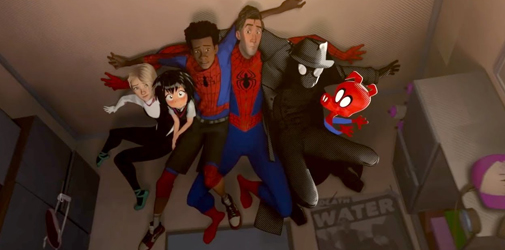
- Annihilation, directed and written for the screen by Alex Garland, based on the novel by Jeff VanderMeer (Paramount Pictures / Skydance)
- Avengers: Infinity War, screenplay by Christopher Markus and Stephen McFeely, directed by Anthony Russo and Joe Russo (Marvel Studios)
- Black Panther, written by Ryan Coogler and Joe Robert Cole, directed by Ryan Coogler (Marvel Studios)
- A Quiet Place, screenplay by Scott Beck, John Krasinski and Bryan Woods, directed by John Krasinski (Platinum Dunes / Sunday Night)
- Sorry to Bother You, written and directed by Boots Riley (Annapurna Pictures)
- Spider-Man: Into the Spider-Verse, screenplay by Phil Lord and Rodney Rothman, directed by Bob Persichetti, Peter Ramsey and Rodney Rothman (Sony)
Best Dramatic Presentation, Short Form
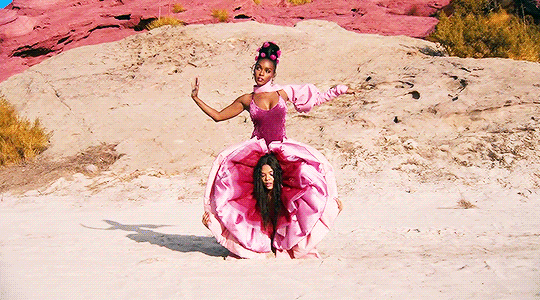
- The Expanse: “Abaddon’s Gate,” written by Daniel Abraham, Ty Franck and Naren Shankar, directed by Simon Cellan Jones (Penguin in a Parka / Alcon Entertainment)
- Doctor Who: “Demons of the Punjab,” written by Vinay Patel, directed by Jamie Childs (BBC)
- Dirty Computer, written by Janelle Monáe, directed by Andrew Donoho and Chuck Lightning (Wondaland Arts Society / Bad Boy Records / Atlantic Records)
- The Good Place: “Janet(s),” written by Josh Siegal & Dylan Morgan, directed by Morgan Sackett (NBC)
- The Good Place: “Jeremy Bearimy,” written by Megan Amram, directed by Trent O’Donnell (NBC)
- Doctor Who: “Rosa,” written by Malorie Blackman and Chris Chibnall, directed by Mark Tonderai (BBC)
A COMPLETE LIST OF NOMINEES (MOST CATEGORIES ARE LITERARY) FOR 2019 IS AFTER THE JUMP. The winners will be announced at the Dublin WorldCon in August. Those who join WorldCon can vote on the awards before August. We've included links if the stories are online. There are also a list of 75th anniversary prizes too for reasons unbeknownst to us so there's a set of nominees for 1944 (aka produced in 1943) as well...
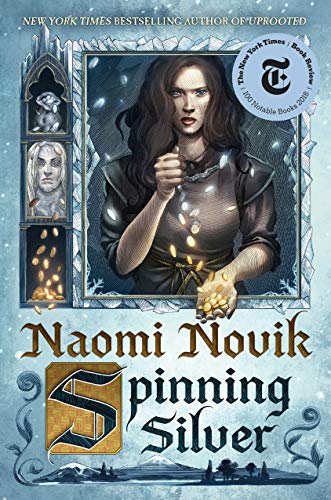 Best Novel
Best Novel
- The Calculating Stars, by Mary Robinette Kowal (Tor)
This one is about a woman trying to be the first 'Lady Astronaut' - Record of a Spaceborn Few, by Becky Chambers (Hodder & Stoughton / Harper Voyager)
Third novel in the "Wayfarers" series - Revenant Gun, by Yoon Ha Lee (Solaris)
Final part of a sci-fi trilogy - Space Opera, by Catherynne M. Valente (Saga)
Eurovision mixed with sci-fi spectacle with galaxies competing for a music prize - Spinning Silver, by Naomi Novik (Del Rey / Macmillan)
'an imaginative retelling of the Rumplestiltskin fairy tale' - Trail of Lightning, by Rebecca Roanhorse (Saga)
An urban fantasy novel about an indigenous monster-hunter
All but one of the novelists in this top category are women. The Hugos have been mired in controversy for the past several years due to representation issues. As far as we understand the controversy (and we might be off here because we're not embedded in this particular world at all as cinephiles who occassionally read sci-fi fantasy books)...since the nominating committee is a paid membership kind of deal, anyone willing to pay the fee (membership to WorldCon) can theoretically have a voice and can theoretically legally manipulate the results (if they get enough buy-in from like-minded fans. So the awards have become a battleground for representation politics things getting really hostile 5 years or so ago when a slate of nominees was mostly approved and pushed by a rabidly sexist patriarchy loving group... so even some of the authors withdrew themselves from consideration (not wanting to be associated). Since then there have been developments both wild (one reactionary-pushed nominee turned out to be doing something like performance art and actually champions diversity) and expected because you can't really stop diversity and it's silly to try. N.K. Jemisin broke a record last year winning thrice consecutively, a first and gave this much-loved speech.
Anyway one imagines these culture wards are not going away any time soon as the sci-fi fantasy publishing world continues to, like Hollywood, have growing pains about who gets a voice and who is honored among the voices we do get to hear.
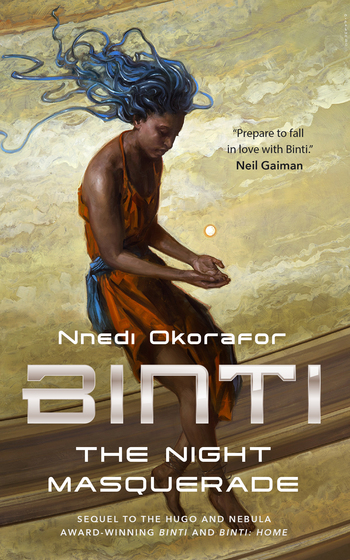 Best Novella (defined as between 17,500 and 40,000 words)
Best Novella (defined as between 17,500 and 40,000 words)
- Artificial Condition, by Martha Wells (Tor.com publishing)
Book two of "The Murderbot Diaries" about an AI with a dark past involving a massacre of humans - Beneath the Sugar Sky, by Seanan McGuire (Tor.com publishing)
Book three in the contemporary fantasy "Wayward Children" series - Binti: The Night Masquerade, by Nnedi Okorafor (Tor.com publishing)
Book three in a sci-fi trilogy - The Black God’s Drums, by P. Djèlí Clark (Tor.com publishing)
Set in an alternate version of New Orleans entanged in Civil War - Gods, Monsters, and the Lucky Peach, by Kelly Robson (Tor.com publishing)
Time travel sci-fi taking place in 2267 and 2000 BC - The Tea Master and the Detective, by Aliette de Bodard (Subterranean Press / JABberwocky Literary Agency)
Takes place in a galactic empire inspired by Vietnamese culture
One male writer made this list, P. Djèlí Clark with a debut novella. I'm always curious about debuts or stand-alones (I think Gods Monsters and the Lucky Peach is a stand alone, too. Not entirely sure) because if there is one entirely regrettable thing about the sci-fi/fantasy genre even within its highest heights its the forcedness of everything being franchiseable with multiple novels.
Best Novelette (defined as betwen 7,500 and 17,500 words)
- “If at First You Don’t Succeed, Try, Try Again,” by Zen Cho (B&N Sci-Fi and Fantasy Blog, 29 November 2018)
- “The Last Banquet of Temporal Confections,” by Tina Connolly (Tor.com, 11 July 2018)
- “Nine Last Days on Planet Earth,” by Daryl Gregory (Tor.com, 19 September 2018)
- The Only Harmless Great Thing, by Brooke Bolander (Tor.com publishing)
- “The Thing About Ghost Stories,” by Naomi Kritzer (Uncanny Magazine 25, November-December 2018)
- “When We Were Starless,” by Simone Heller (Clarkesworld 145, October 2018)
Best Short Story (defined as under 7,500 words)
- “The Court Magician,” by Sarah Pinsker (Lightspeed, January 2018)
- “The Rose MacGregor Drinking and Admiration Society,” by T. Kingfisher (Uncanny Magazine 25, November-December 2018)
- “The Secret Lives of the Nine Negro Teeth of George Washington,” by P. Djèlí Clark (Fireside Magazine, February 2018)
- “STET,” by Sarah Gailey (Fireside Magazine, October 2018)
- “The Tale of the Three Beautiful Raptor Sisters, and the Prince Who Was Made of Meat,” by Brooke Bolander (Uncanny Magazine 23, July-August 2018)
- “A Witch’s Guide to Escape: A Practical Compendium of Portal Fantasies,” by Alix E. Harrow (Apex Magazine, February 2018)
Best Series
- The Centenal Cycle, by Malka Older (Tor.com publishing)
- The Laundry Files, by Charles Stross (most recently Tor.com publishing/Orbit)
- Machineries of Empire, by Yoon Ha Lee (Solaris)
- The October Daye Series, by Seanan McGuire (most recently DAW)
- The Universe of Xuya, by Aliette de Bodard (most recently Subterranean Press)
- Wayfarers, by Becky Chambers (Hodder & Stoughton / Harper Voyager)
Best Related Work
- Archive of Our Own, a project of the Organization for Transformative Works
- Astounding: John W. Campbell, Isaac Asimov, Robert A. Heinlein, L. Ron Hubbard, and the Golden Age of Science Fiction, by Alec Nevala-Lee (Dey Street Books)
- The Hobbit Duology (documentary in three parts), written and edited by Lindsay Ellis and Angelina Meehan (YouTube)
- An Informal History of the Hugos: A Personal Look Back at the Hugo Awards, 1953-2000, by Jo Walton (Tor)
- www.mexicanxinitiative.com: The Mexicanx Initiative Experience at Worldcon 76 (Julia Rios, Libia Brenda, Pablo Defendini, John Picacio)
- Ursula K. Le Guin: Conversations on Writing, by Ursula K. Le Guin with David Naimon (Tin House Books)
Best Graphic Story
- Abbott, written by Saladin Ahmed, art by Sami Kivelä, colours by Jason Wordie, letters by Jim Campbell (BOOM! Studios)
- Black Panther: Long Live the King, written by Nnedi Okorafor and Aaron Covington, art by André Lima Araújo, Mario Del Pennino and Tana Ford (Marvel)
- Monstress, Volume 3: Haven, written by Marjorie Liu, art by Sana Takeda (Image Comics)
- On a Sunbeam, by Tillie Walden (First Second)
- Paper Girls, Volume 4, written by Brian K. Vaughan, art by Cliff Chiang, colours by Matt Wilson, letters by Jared K. Fletcher (Image Comics)
- Saga, Volume 9, written by Brian K. Vaughan, art by Fiona Staples (Image Comics)
Best Editor, Short Form
- Neil Clarke
- Gardner Dozois
- Lee Harris
- Julia Rios
- Lynne M. Thomas and Michael Damian Thomas
- E. Catherine Tobler
Best Editor, Long Form
- Sheila E. Gilbert
- Anne Lesley Groell
- Beth Meacham
- Diana Pho
- Gillian Redfearn
- Navah Wolfe
Best Professional Artist
Best Semiprozine
- Beneath Ceaseless Skies, editor-in-chief and publisher Scott H. Andrews
- Fireside Magazine, edited by Julia Rios, managing editor Elsa Sjunneson-Henry, social coordinator Meg Frank, special features editor Tanya DePass, founding editor Brian White, publisher and art director Pablo Defendini
- FIYAH Magazine of Black Speculative Fiction, executive editors Troy L. Wiggins and DaVaun Sanders, editors L.D. Lewis, Brandon O’Brien, Kaleb Russell, Danny Lore, and Brent Lambert
- Shimmer, publisher Beth Wodzinski, senior editor E. Catherine Tobler
- Strange Horizons, edited by Jane Crowley, Kate Dollarhyde, Vanessa Rose Phin, Vajra Chandrasekera, Romie Stott, Maureen Kincaid Speller, and the Strange Horizons Staff
- Uncanny Magazine, publishers/editors-in-chief Lynne M. Thomas and Michael Damian Thomas, managing editor Michi Trota, podcast producers Erika Ensign and Steven Schapansky, Disabled People Destroy Science Fiction Special Issue editors-in-chief Elsa Sjunneson-Henry and Dominik Parisien
Best Fanzine
- Galactic Journey, founder Gideon Marcus, editor Janice Marcus
- Journey Planet, edited by Team Journey Planet
- Lady Business, editors Ira, Jodie, KJ, Renay & Susan
- nerds of a feather, flock together, editors Joe Sherry, Vance Kotrla and The G
- Quick Sip Reviews, editor Charles Payseur
- Rocket Stack Rank, editors Greg Hullender and Eric Wong
Best Fancast
- Be the Serpent, presented by Alexandra Rowland, Freya Marske and Jennifer Mace
- The Coode Street Podcast, presented by Jonathan Strahan and Gary K. Wolfe
- Fangirl Happy Hour, hosted by Ana Grilo and Renay Williams
- Galactic Suburbia, hosted by Alisa Krasnostein, Alexandra Pierce, and Tansy Rayner Roberts, produced by Andrew Finchfan
- Our Opinions Are Correct, hosted by Annalee Newitz and Charlie Jane Anders
- The Skiffy and Fanty Show, produced by Jen Zink and Shaun Duke, hosted by the Skiffy and Fanty Crew
Best Fan Writer
- Foz Meadows
- James Davis Nicoll
- Charles Payseur
- Elsa Sjunneson-Henry
- Alasdair Stuart
- Bogi Takács
Best Fan Artist
Best Art Book
This is a one-off category. Each year's WorldCon gets to have one and Dublin created an award for an art book.
- The Books of Earthsea: The Complete Illustrated Edition, illustrated by Charles Vess, written by Ursula K. Le Guin (Saga Press /Gollancz)
- Daydreamer’s Journey: The Art of Julie Dillon, by Julie Dillon (self-published)
- Dungeons & Dragons Art & Arcana: A Visual History, by Michael Witwer, Kyle Newman, Jon Peterson, Sam Witwer (Ten Speed Press)
- Spectrum 25: The Best in Contemporary Fantastic Art, ed. John Fleskes (Flesk Publications)
- Spider-Man: Into the Spider-Verse – The Art of the Movie, by Ramin Zahed (Titan Books)
- Tolkien: Maker of Middle-earth, ed. Catherine McIlwaine (Bodleian Library)
NOT STRICTLY HUGO AWARDS BUT ALSO GIVEN OUT AT WORLDCON
Lodestar Award for Best Young Adult Book
- The Belles, by Dhonielle Clayton (Freeform / Gollancz)
- Children of Blood and Bone, by Tomi Adeyemi (Henry Holt / Macmillan Children’s Books)
- The Cruel Prince, by Holly Black (Little, Brown / Hot Key Books)
- Dread Nation, by Justina Ireland (Balzer + Bray)
- The Invasion, by Peadar O’Guilin (David Fickling Books / Scholastic)
- Tess of the Road, by Rachel Hartman (Random House / Penguin Teen)
John W. Campbell Award for Best New Writer
- Katherine Arden*
- S.A. Chakraborty*
- R.F. Kuang
- Jeannette Ng*
- Vina Jie-Min Prasad*
- Rivers Solomon*
* = this is their last year of eligibility (writers are eligible for two years after their first professionally published work)
1944 RETROSPECTIVE HUGOS
Best Dramatic Presentation, Long Form
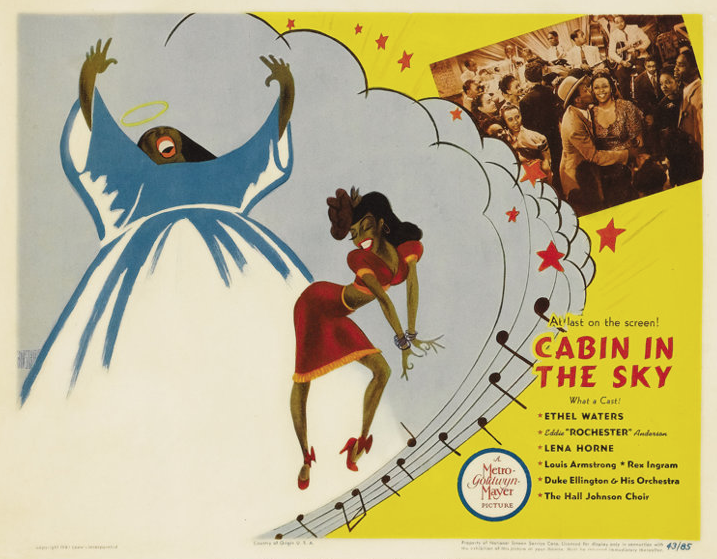
- Batman, written by Victor McLeod, Leslie Swabacker and Harry L. Fraser, directed by Lambert Hillyer (Columbia Pictures)
- Cabin in the Sky, written by Joseph Schrank, directed by Vincente Minnelli and Busby Berkeley (uncredited) (MGM)
- A Guy Named Joe, written by Frederick Hazlitt Brennan and Dalton Trumbo, directed by Victor Fleming (MGM)
- Heaven Can Wait, written by Samson Raphaelson, directed by Ernst Lubitsch (20th Century Fox)
- Münchhausen, written by Erich Kästner and Rudolph Erich Raspe, directed by Josef von Báky (UFA)
- Phantom of the Opera, written by Eric Taylor, Samuel Hoffenstein and Hans Jacoby, directed by Arthur Lubin (Universal Pictures)
Best Dramatic Presentation, Short Form
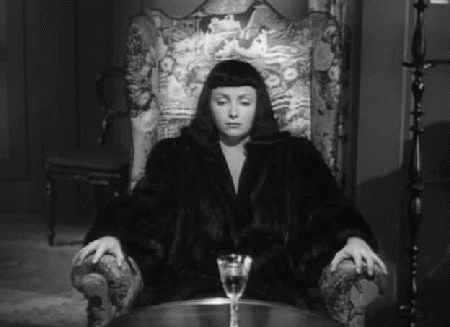
- The Ape Man, written by Barney A. Sarecky, directed by William Beaudine (Banner Productions)
- Frankenstein Meets the Wolfman, written by Curt Siodmak, directed by Roy William Neill (Universal Pictures)
- Der Fuehrer’s Face, story by Joe Grant and Dick Huemer, directed by Jack Kinney (Disney)
- I Walked With a Zombie, written by Curt Siodmak and Ardel Wray, directed by Jacques Tourneur (RKO Radio Pictures)
- The Seventh Victim, written by Charles O’Neal and DeWitt Bodeen, directed by Mark Robson (RKO Radio Pictures)
- Super-Rabbit, written by Tedd Pierce, directed by Charles M. Jones (Warner Bros)
Best Novel
- Conjure Wife, by Fritz Leiber, Jr. (Unknown Worlds, April 1943)
- Earth’s Last Citadel, by C.L. Moore and Henry Kuttner (Argosy, April 1943)
- Gather, Darkness! by Fritz Leiber, Jr. (Astounding Science-Fiction, May-July 1943)
- Das Glasperlenspiel [The Glass Bead Game], by Hermann Hesse (Fretz & Wasmuth)
- Perelandra, by C.S. Lewis (John Lane, The Bodley Head)
- The Weapon Makers, by A.E. van Vogt (Astounding Science-Fiction, February-April 1943)
Best Novella
- “Attitude,” by Hal Clement (Astounding Science-Fiction, September 1943)
- “Clash by Night,” by Lawrence O’Donnell (Henry Kuttner & C.L. Moore) (Astounding Science-Fiction, March 1943)
- “The Dream-Quest of Unknown Kadath,” by H.P. Lovecraft, (Beyond the Wall of Sleep, Arkham House)
- The Little Prince, by Antoine de Saint-Exupéry (Reynal & Hitchcock)
- The Magic Bed-Knob; or, How to Become a Witch in Ten Easy Lessons, by Mary Norton (Hyperion Press)
- “We Print the Truth,” by Anthony Boucher (Astounding Science-Fiction, December 1943)
Best Novelette
- “Citadel of Lost Ships,” by Leigh Brackett (Planet Stories, March 1943)
- “The Halfling,” by Leigh Brackett (Astonishing Stories, February 1943)
- “Mimsy Were the Borogoves,” by Lewis Padgett (C.L. Moore & Henry Kuttner) (Astounding Science-Fiction, February 1943)
- “The Proud Robot,” by Lewis Padgett (Henry Kuttner) (Astounding Science-Fiction, February 1943)
- “Symbiotica,” by Eric Frank Russell (Astounding Science-Fiction, October 1943)
- “Thieves’ House,” by Fritz Leiber, Jr (Unknown Worlds, February 1943)
Best Short Story
- “Death Sentence,” by Isaac Asimov (Astounding Science Fiction, November 1943)
- “Doorway into Time,” by C.L. Moore (Famous Fantastic Mysteries, September 1943)
- “Exile,” by Edmond Hamilton (Super Science Stories, May 1943)
- “King of the Gray Spaces” (“R is for Rocket”), by Ray Bradbury (Famous Fantastic Mysteries, December 1943)
- “Q.U.R.,” by H.H. Holmes (Anthony Boucher) (Astounding Science-Fiction, March 1943)
- “Yours Truly – Jack the Ripper,” by Robert Bloch (Weird Tales, July 1943)
Best Graphic Story
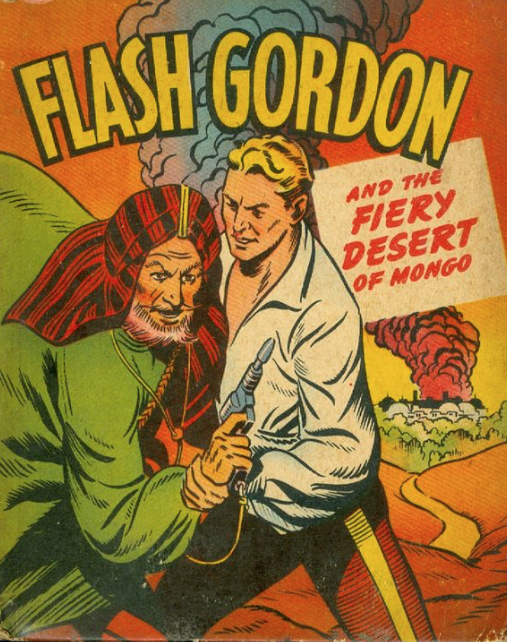
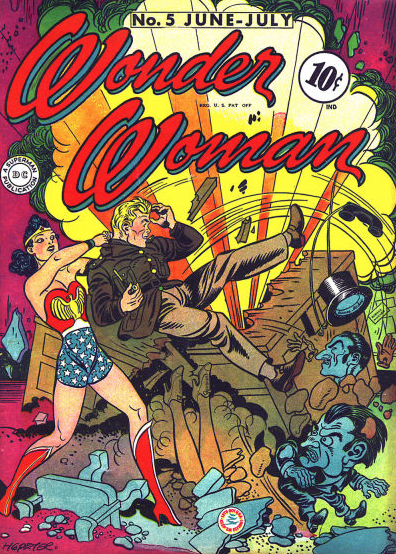
- Buck Rogers: Martians Invade Jupiter, by Philip Nowlan and Dick Calkins (National Newspaper Service)
- Flash Gordon: Fiery Desert of Mongo, by Alex Raymond (King Features Syndicate)
- Garth, by Steve Dowling (Daily Mirror)
- Plastic Man #1: The Game of Death, by Jack Cole (Vital Publications)
- Le Secret de la Licorne [The Secret of the Unicorn], by Hergé (Le Soir)
- Wonder Woman #5: Battle for Womanhood, written by William Moulton Marsden, art by Harry G. Peter (DC Comics)
Best Editor, Short Form
- John W. Campbell
- Oscar J. Friend
- Mary Gnaedinger
- Dorothy McIlwraith
- Raymond A. Palmer
- Donald A. Wollheim
Best Professional Artist
- Hannes Bok
- Margaret Brundage
- Virgil Finlay
- Antoine de Saint-Exupéry
- J. Allen St. John
- William Timmins
Best Fanzine
- Fantasy News, editor William S. Sykora
- Futurian War Digest, editor J. Michael Rosenblum
- The Phantagraph, editor Donald A. Wollheim
- Voice of the Imagi-Nation, editors Jack Erman (Forrest J Ackerman) & Morojo (Myrtle Douglas)
- YHOS, editor Art Widner
- Le Zombie, editor Wilson “Bob” Tucker
Best Fan Writer
- Forrest J. Ackerman
- Morojo (Myrtle Douglas)
- Jack Speer
- Wilson “Bob” Tucker
- Art Widner
- Donald A. Wollheim